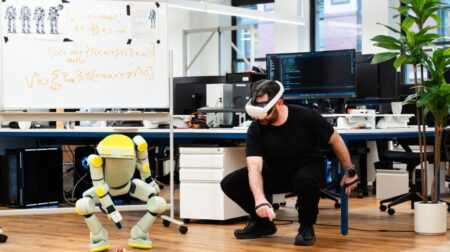More than 20 billion robots will be serving humanity by the year 2050, according to the United Arab Emirates Minister of Cabinet Affairs and Chairman of the World Government Summit, Mohammad Abdullah Al Gergawi.
The forecast was delivered during his keynote address at the opening of the 2025 World Government Summit in Dubai.
Al Gergawi also predicted major advances in human augmentation, which he said would enhance both physical and cognitive abilities, enabling people to live longer, work more productively, and tackle challenges previously thought unsolvable in fields such as medicine, environmental science, and space exploration.
He projected that the global population will reach 10 billion by mid-century, with much of the growth concentrated in Africa and Asia. More than 20% of the world’s population is expected to be over 60, creating increased demand for healthcare and social systems. He also forecast that the global space economy would reach a value of US$4tn.
Reflecting on the past 25 years, Al Gergawi described the period as both turbulent and transformative. He noted that the world’s population has risen to 8.2 billion, while the global economy has expanded from US$34tn to US$115tn by 2024. Over the same period, international trade grew from US$7tn to US$33tn.
He pointed to a shift in economic influence from traditional sectors such as oil and heavy manufacturing to technology companies and digital platforms. Al Gergawi also commented on geopolitical changes, noting the emergence of China and India as global powers, in contrast to the relative decline of some industrialised nations.
hile the early 2000s were marked by optimism around globalisation, he said this has since been tempered by the rise of populism and protectionist policies.
Digital transformation was another key theme. Al Gergawi highlighted the increase in global internet usage, from less than 7% of the population in 2000 to over 60% today, and the rise of digital currencies, now valued at around US$3tn, despite being virtually nonexistent at the turn of the millennium.
He also addressed the evolution of warfare, observing that technologies once confined to science fiction, such as military robotics, drone strikes and AI-driven conflict, have become reality.
Reviewing the consequences of decisions made over the last quarter-century, Al Gergawi identified four critical areas. First was the cost of conflict and displacement: more than two million people have died in wars, and over 120 million have been forcibly displaced. He noted that only 4% of conflicts have ended through peace agreements, raising questions about the preference for military solutions over diplomacy.
Second, he addressed public trust in governments, which he said has declined since 2000, as seen in rising numbers of protests and the spread of populist movements.
Third, Al Gergawi argued that economic prosperity does not equate to citizen well-being. Despite their wealth, many major economies are not among the world’s happiest. He cited the 280 million people suffering from depression and the US$1tn annual cost of mental health issues globally.
Finally, while acknowledging progress in education, healthcare and overall well-being, he emphasised that 630 million people continue to live in extreme poverty. He noted that eliminating hunger, providing universal education and building global healthcare systems would require an estimated US$800bn per year.
Innovative applications of technology in retail and e-commerce, healthcare and pharmaceuticals, food and beverage, automotive, transport & logistics, and more will be celebrated at the Robotics & Automation Awards on 29 October 2025 at De Vere Grand Connaught Rooms in London. Visit www.roboticsandautomationawards.co.uk to learn more about this unmissable event for the UK’s robotics and automation sectors!









